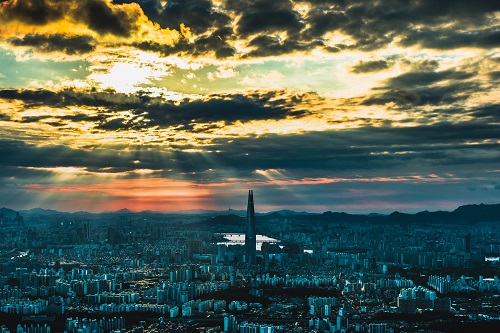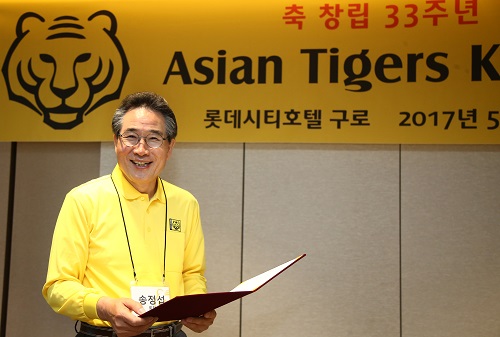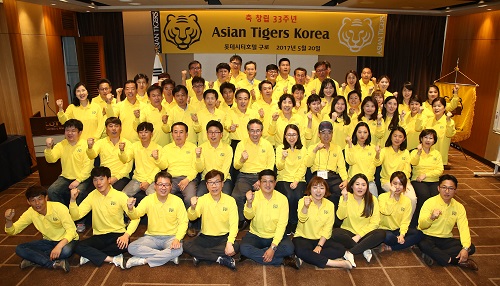Steve Jordan talks to Joseph Song in Seoul about living and working in the shadow of the Kim Jong-un threat.

It seems that every day we have another report from North Korea detailing the latest show of strength from its leader, Kim Jong-un. For most of us this tension is worrying, if not frightening to some, but what’s it like living and working under the shadow of this Korean threat? And what has been the effect on the moving industry in its southern neighbour?
Joseph Song has lived with the tension between North and South all his life. Since the cessation of hostilities in 1953 there has been a war of words, and sometimes more, between the two sides. Of course, as there was no official peace treaty, North and South Korea are, technically, still at war.
 Joseph started his moving business, Transpack, in 1984; it has since become a part of Asian Tigers under the name of Asian Tigers Mobility - Korea. Ironically, it is to the Korean War (1950-53) that the Korean moving industry owes its very existence. US troops were stationed there and by the 1960s the industry was growing fast with an increased flow of diplomatic staff and multinational businesses flooding into the peninsular. The next three decades saw an economic boom with the rise of the banking sector, the entry of oil and chemical companies into the market, major expansions of the country’s automobile and ship building industries, and the increase in emigration as Korean people began to spread their wings.
Joseph started his moving business, Transpack, in 1984; it has since become a part of Asian Tigers under the name of Asian Tigers Mobility - Korea. Ironically, it is to the Korean War (1950-53) that the Korean moving industry owes its very existence. US troops were stationed there and by the 1960s the industry was growing fast with an increased flow of diplomatic staff and multinational businesses flooding into the peninsular. The next three decades saw an economic boom with the rise of the banking sector, the entry of oil and chemical companies into the market, major expansions of the country’s automobile and ship building industries, and the increase in emigration as Korean people began to spread their wings.
Surprisingly, despite all the rhetoric coming out of Washington (or at least from Mr Trump’s mobile phone) and Pyongyang, and rockets flying over Japan and those targeted on Guam, life continues more or less as normal for Joseph and his team in Seoul.
“People who live outside Korea see this in a totally different way,” he said. “We have lived with this for seven decades. Right back to the cease fire in 1953 we have had problems with Kim Jong-un’s father and grandfather before him.”
There has been no shortage of aggressive attacks by the North in that time, any of which could have sparked an escalation, but didn’t. The sinking of the South Korean Dangpo in 1967 with the loss of 39 lives; assassination attempts of South Korean presidents; the ‘Axe Murder’ incident in which two US servicemen were killed while chopping down a tree in the demilitarized zone; the bombing of Korean Air flight 858 in 1987 with the loss of 115 people; and the sea battles and subsequent bombardment of the island of Yeonpyeong in 2010.
The relationship between North and South Korea ebbs and flows. There are times of extreme tension, and times when an element of cooperation returns. Back in 2002, for example, the Kaesong Industrial Region was formed. This is an industrial park located in North Korea, just six miles across the border, within an hour’s drive from Seoul. As a collaborative economic development between North and South the park employed over 50,000 North Korean workers making goods for sale in and export from South Korea. The staff wages were all paid to the North Korean government.
The Kaesong park worked well for over ten years, despite the North restricting access from the South during periods of tension. But it did seem that the North used the money raised to continue its military development and further threaten the South and its allies. In 2013, when crisis struck again, the North blocked access from the South and recalled all its workers. This effectively shut down all activities but both sides agreed that it should re-open when possible. With the increasing tension, it seems this is unlikely to happen any time soon.
Not only did this cut off the economic benefit to both sides, it also silenced any real dialogue between them. “Since we closed the border there are no direct channel talks,” explained Joseph. “That communication doesn’t exist now.”
Of course, everyone worries that a war between the South and North would escalate into something unimaginable involving China, the USA, Japan and allies of each. “The current situation is very high risk, but the reality is different,” said Joseph. “Kim Jong-un is not stupid. He talks a lot like Trump, with bellicose rhetoric, but unless he wants to commit suicide, it will just remain as posturing. He knows that all the high-ranking people in North Korea will not survive a military conflict. He and Trump can have a war of words but, behind the scenes, there are people working on both sides to resolve this. The Americans are not stupid either.”

So why does Kim Jong-un insist on flexing his muscles in this way? Joseph believes that it’s just his chosen survival tactic. It’s just a way of getting his voice heard. North Korea is a small country with a poor economy that is wedged between, Russia, China, Japan and the USA. It wants to have a voice. “But the US chooses not to listen and always talks within six-party negotiations that include China, Russia, Japan, North and South Korea and the US.”
Joseph does not believe that North Korea will give up its nuclear programme. “That’s their core power tool to talk to the rest of the world. Nobody would listen to them otherwise. But they can’t easily use it. They are trying to get attention like a spoilt child. There are many ways to stop a child crying.”
But quite how the situation can be resolved, Joseph does not know. “Our new government has tried to re-establish trade and the Kaesong manufacturing complex, but there are a lot of difficulties. In the end, it will all depend on the pressure put on Pyongyang by China and the USA.”
From a business point of view, however, Joseph said that there has been no increase in the number of people leaving Seoul. He said that some people, who are near the end of their contracts might choose to move a little earlier. But the flow of business through South Korea continues undimmed and, therefore, the flow of global transferees. “There might be some transferees who are hanging back, waiting to see how things develop, but it’s not had a major effect yet.”
“Koreans,” he said, “are very optimistic people. Just like the Italians and Greeks, we love to sing and love to be joyful. Of course, the problems in the North are worrying, but we have seen it all before and life on the streets of Seoul continues just as normal.”
European Chamber of Commerce meets to discuss North Korea
On 6 September Joseph attended an information session, presented by the European Chamber of Commerce in Korea, on the subject of North Korea – What’s Next? Its conclusion mirrored Joseph’s own opinion that there are no good options, North Korea will continue its nuclear programme until it gets the recognition it feels it deserves, the situation will remain high risk but it’s unlikely that it will dissolve into military confrontation.
Click here to see the next Editor's Pick